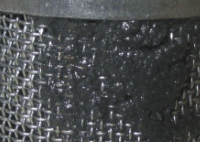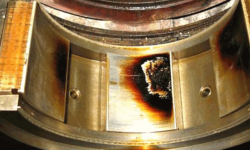When Routine Oil Analysis Isn't Enough,
Get Answers With MIA
Case Study: Hydrogen Sulfide Gas Compressor
A sample of Royal Purple Synfilm NGL 100 from a hydrogen sulfide gas compressor was submitted for Material Identification Analysis (MIA) testing. It was reported that the oil heat exchangers appeared to be clogging which reduces flow and cooling. Clogged heat exchangers also caused the oil pump to run at high speeds and exceed normal operating temperatures. At one point, the company became aware that elemental sulfur had been generated and cycled through the system. The machine was not operating for a couple months and upon startup oxygen levels were increased for one to two days and water accrued in the system.
The oil as received had a dark brown gritty substance settled to the bottom of the sample bottle. The debris was isolated from the lubricant and extracted into organic and inorganic fractions. The organic fraction was identified as oxidation byproducts (carboxylic acid and aromatic compounds) and aromatic sulfonate. Aromatic sulfonate is commonly used in detergents and suggests the system was contaminated with a cleaner. The inorganic fraction was comprised of sulfate salt which most likely formed from elemental sulfur adhering to carboxylate ions. The primary issues of concern was the rapid rate of oxidation over the course of three weeks, possible contamination from a detergent, and residual elemental sulfur.
TestOil's Recommendation:
An inspection of machine components is recommended. In addition, due to the amount of debris and water found during the analysis a thorough flush of the system is recommended. It was reported that this system was not operating for a period of time during which oil analysis was not occurring. It would be appropriate to continue with routine oil analysis while the machine is down if there is a possibility of product contamination, faulty maintenance, or the heater exchangers remain on. Investigating other lubricant options with the machine manufacturer such as Royal Purple Acilube, engine oils, or crankcase fluids may help prevent these issues in the future as they are more capable of handling acid production.
To view the actual report from this case study, please click here.






